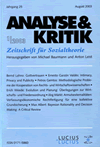Suchergebnisse
"Ernst Fehr"
Titel: Human Altruism - Proximate Patterns and Evolutionary Origins
Autor: Ernst Fehr / Urs Fischbacher
Seite: 6-47
Abstract: Are people selfish or altruistic? Throughout history this question has been answered on the basis of much introspection and little evidence. It has been at the heart of many controversial debates in politics, science, and philosophy. Some of the most fundamental questions concerning our evolutionary origins, our social relations, and the organization of society are centered around issues of altruism and selfishness. Experimental evidence indicates that human altruism is a powerful force and unique in the animal world. However, there is much individual heterogeneity and the interaction between altruists and selfish individuals is key for understanding the evolutionary dynamics as well as the proximate patterns of human cooperation. Depending on the environment, a minority of altruists can force a majority of selfish individuals to cooperate or, conversely, a few egoists can induce a large number of altruists to defect. Current gene-based evolutionary theories cannot explain important patterns of human altruism pointing towards the need for theories of cultural evolution and gene-culture coevolution.
Titel: Altruists with Green Beards
Autor: Ernst Fehr / Urs Fischbacher
Seite: 73-84
Abstract: If cooperative dispositions are associated with unique phenotypic features ('green beards'), cooperative individuals can be identi ed. Therefore, cooperative individuals can avoid exploitation by defectors by cooperating exclusively with other cooperative individuals; consequently, cooperators ourish and defectors die out. Experimental evidence suggests that subjects, who are given the opportunity to make promises in face-to-face interactions, are indeed able to predict the partner's behavior better than chance in a subsequent Prisoners' Dilemma. This evidence has been interpreted as evidence in favor of green beard approaches to the evolution of human cooperation. Here we argue, however, that the evidence does not support this interpretation. We show, in particular, that the existence of conditional cooperation renders subjects' choices in the Prisoners' Dilemma predictable. However, although subjects predict behavior better than chance, sel sh individuals earn higher incomes than conditional cooperators. Thus, although subjects may predict other players' choices better than chance evolution favors the sel sh subjects, i.e., the experimental evidence does not support the green beard approach towards the evolution of cooperation.
Titel: Altruists with Green Beards: Still Kicking?
Autor: Robert H. Frank
Seite: 85-96
Abstract: In earlier work, I proposed the 'adaptive standard of rationality', according to which narrow self-interest models can be broadened by positing additional tastes, but only upon a plausible showing that those tastes do not hamper resource acquisition in competitive environments. This proposal is related to the green beard hypothesis from biology, according to which altruism might be adaptive if its presence could be reliably signaled by some observable feature, such as a green beard. In their contri- bution to this issue Ernst Fehr and Urs Fischbacher o er theoretical arguments and describe laboratory experiments whose results they interpret as refuting my version of the green beard hypothesis. In this response, I argue that their theoretical arguments and experimental evidence pose no threat to the green beard hypothesis.
Titel: Strong Reciprocity and the Comparative Method
Autor: Christopher Stephens
Seite: 97-105
Abstract: Ernst Fehr and his collaborators have argued that traditional explanations of human cooperation cannot account for strong reciprocity. They provide substantial empirical evidence that strong reciprocity is an important phenomenon that cannot be explained by the traditional models of kin selection or reciprocal altruism. In this note, however, I argue that it will be di cult to test speci c adaptive explanations of strong reciprocity because it is apparently unique to humans. Consequently, it is di cult to employ the comparative method, which is one of biology's best tools for testing adaptationist claims.
Titel: Social Relations Instead of Altruistic Punishment
Autor: Anton Leist
Seite: 158-171
Abstract: Ernst Fehr's experimental research on altruistic behaviour aims at superseding the classical homo oeconomicus in micro-economic behaviour theory. This essay discusses Fehr's results from two points of view: rst, in regard to the understanding of social action associated with the term "altruism"; second, in regard to the 'anthropological' strategy of research that is based on the laboratory method. Against the emphasis on altruism it will be argued that it misleads into providing a distorted description of social acting, and that, due to insu cient clarity about motives for acting, Fehr's empirical results give evidence not of altruism but rather of phenomena of social recognition. The objection against the anthropological strategy will be that it makes visible only local phenomena within prevailing social conditions and that it thus assumes more than it explains.
Titel: Fehr on Altruism, Emotion, and Norms
Autor: Jon Elster
Seite: 197-211
Abstract: I discuss recent work by Ernst Fehr and his collaborators on cooperation and reciprocity. (i) Their work demonstrates conclusively the reality and importance of non-self-interested motivations. (ii) It allows for a useful distinction between trust and blind trust. (iii) It points to a category of quasi-moral norms, distinct both from social norms and moral norms. (iv) It demonstrates how social interactions can generate irrational belief formation. (v) It shows the potential of punishment for sustaining social norms and for overcoming the second-order free rider problem as well as obstacles to group selection. (vi) It o ers a provocative experimental basis for the `warm-glow' explanation of altruistic behavior. I conclude by suggesting some experiments that might allow for further developments of the theory.

Ernst Fehr on Human Altruism. An Interdisciplinary Debate
2005 (27) Heft 1
Editorial
In the foregoing decade, two related developments in the behavioural sciences have drawn the attention of social scientists, particularly economists. The first is the use of laboratory experiments in the investigation of human behaviour. Although the use of such experiments has a longer history, only in the last decade has ’experimental economics’ become a sub-discipline of economics with which economists of just about all colours are familiar; indeed, experimental results regularly feed int...